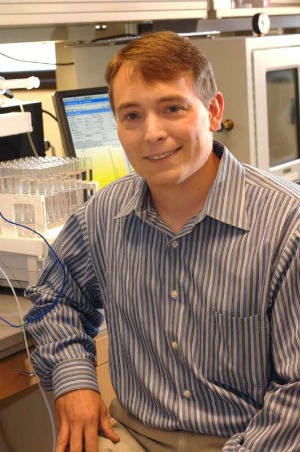
Cancer cells grow in a seemingly haphazard fashion. They have lost the ability to connect with neighboring cells in a normal, well-ordered way.
Instead, these microscopic “pirates” have acquired the ability to invade normal tissues and to wreak damage long distances through a process known as metastasis.
E-cadherin, a protein that “glues” normal cells together, may be a key to identifying and stopping this early anarchic growth. Expression of the E-cadherin gene and therefore the amount of the protein it produces are abnormally low in many cancers.
Now Vanderbilt University researchers led by Daniel Beauchamp, Craig Lindsley and David Weaver have identified small molecules that, in the laboratory, can restore normal E-cadherin expression in human colorectal carcinoma cells and prevent invasive growth.
Their findings were published in ACS Chemical Biology earlier this year.
“One of our ultimate goals is to identify compounds that block or reverse epithelial-to-mesenchymal transition, an important mechanism that contributes to cancer invasion and metastasis,” said Beauchamp, the John Clinton Foshee Distinguished Professor of Surgery and chair of the section of surgical sciences.
Beauchamp’s lab in the Vanderbilt-Ingram Cancer Center joined forces with Lindsley, Weaver and their colleagues in the Vanderbilt Institute of Chemical Biology to search for small molecules that restored normal cell-to-cell adhesion to malignant colon cancer cells.
Weaver, an assistant professor of pharmacology, directs the VICB High-Throughput Screening Facility, where researchers rapidly sift through “libraries” of thousands of small molecules to pick out those with a desired activity.

The researchers identified four small molecules that increased E-cadherin expression and suppressed tumor cell invasiveness in the laboratory. Via gene profiling, they demonstrated that the compounds activated the gene controlling E-cadherin expression. Further work is under way to identify their precise molecular target and mode of action.
By blocking early signs of invasive behavior, “these compounds may represent a starting point for the development of small molecules to treat metastatic colon cancer,” the researchers concluded.
“This is a perfect example of the collegial enterprise at Vanderbilt and within the VICB, bringing together all the necessary expertise to perform cutting-edge translational science that neither investigator could have accomplished alone,” said Lindsley, professor of pharmacology and chemistry, and principal investigator of the Specialized Chemistry Center for Accelerated Probe Development.
Co-authors of the study were Sydney Stoops, Suzanne Brady, Emily Days, Chris Farmer, Scott Pearson, Alex Waterson and Connie Weaver.
The study was supported by the National Cancer Institute through the Vanderbilt-Ingram Cancer Center and the center’s Specialized Program in Research Excellence in gastrointestinal cancer.